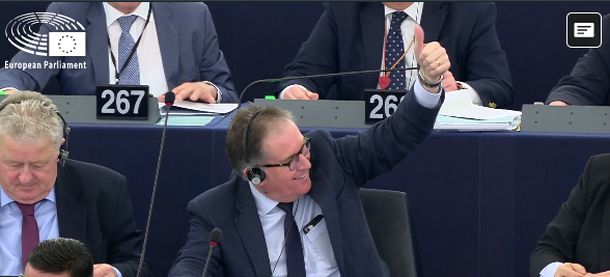
For the first time in almost three years, an EU member state fishing vessel has been detected in the waters of occupied Western Sahara.
The m.v. Franziska , a 6,900 tonne capacity stern trawler, has been spotted fishing southwest off Dakhla since last weekend. The vessel is owned and operated by the Dutch company W. van der Zwan & Zn B.V., which in turn is part of the Pelagic Freezer-trawler Association (PFA).
The Franziska is the first EU flagged vessel in almost three years to fish in the waters off Western Sahara, a territory that is largely occupied by Morocco since 1975. Morocco's self-proclaimed sovereignty over Western Sahara has not been recognised by any government in the world, and the UN Security Counsel's Legal Counsel has declared that the territory's natural endownments cannot be exploited without consent of and benefit to the Saharawi people.
It is not the first time that a vessel owned by W. van der Zwan is active in the occupied Western Sahara. When confronted by WSRW's Dutch members on the matter in 2010, PFA replied, relinquishing any responsibility onto the European Commission.
In December 2011, the European Parliament rejected a proposed prolongation of the EU-Morocco Fisheries Partnership Agreement, following reports on its damaging ecological impact, financial loss to the Union and concerns over its compatibility with international law for failing to exclude Western Sahara from its scope. Accordingly, EU fishing in Morocco and Western Sahara ceased.
But a new agreement - reviewing EU borne expenses of the deal yet failing to address the ecological and legal obstacles - was aproved by the European Parliament in December 2013. The king of Morocco ratified the agreement in July this year.
Several Spanish vessels have this weekend passed Morocco's technical vetting process, allowing them to resume fishing. Spain has been the main driving force behind the new agreement, receiving the lion's share of the fishing licences accorded under the deal.
The Saharawi people, ironically once regarded as Spanish citizens during Spain's colonisation of their land, never gave its consent to the EU-Morocco Fisheries Agreement, and have consistently voiced their opposition to the deal. Several Saharawis were injured by Moroccan police as they protested against the European Parliament's decision to approve the fisheries protocol for their occupied waters.
Here is the EU Council's legal advice on fishing in occupied waters
Hans Corell criticizes EU fisheries in Western Sahara
The former Legal Counsel to the UN Security Counsel, Mr. Hans Corell, comments on the EU's fisheries activities in Western Sahara.
EU Court reaffirms position on Western Sahara
Polisario has a case, but it should be pursued when the time is right, Court implies.
European Parliament disregards Court and adopts Morocco fish deal
Notwithstanding four consecutive rulings of the EU's highest Court calling such a practice illegal, the European Parliament has just now voted in favour of the EU-Morocco Fisheries Agreement that will be applied to the waters of occupied Western Sahara.


